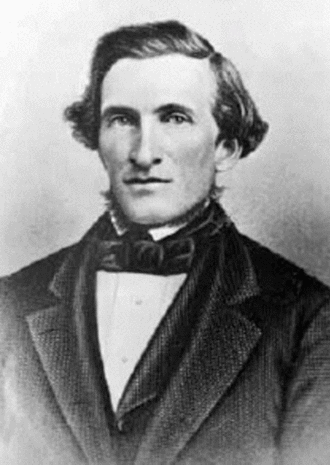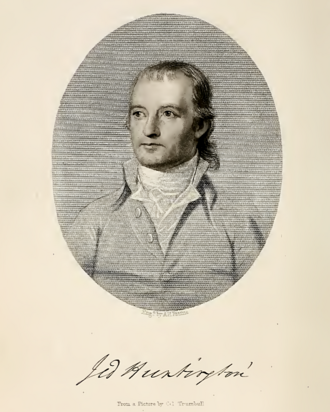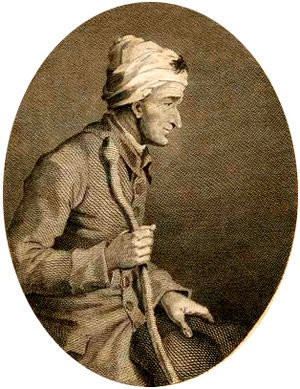Discover Your Roots
SIGN UPDiscover Your Roots
SIGN UPJedediah is a male given name of Hebrew origin, meaning "Friend of God." Derived from the name Yedidyah, it signifies being beloved by Jah. In the Hebrew Bible, Jedidiah was the second or "blessing" name given to Solomon, the second son of King David and Bathsheba, by the prophet Nathan. This name has been carried by notable individuals throughout history, including American writer Jedediah Berry and English mathematician Jedediah Buxton. In fiction, characters such as Jedediah Leland in "Citizen Kane" and Jedidiah Sawyer in "The Texas Chainsaw Massacre" also bear this name. Additionally, it has been associated with fictional figures like Jebediah Kerman in the spaceflight simulator game Kerbal Space Program. The name Jedediah has a rich cultural and historical significance, reflecting a strong connection to spirituality and enduring legacies.

Jedediah Spenser Purdy, born on 29 November 1974 in Chloe, West Virginia, is an esteemed American legal scholar and cultural commentator. In 2022, he attained the distinguished title of Raphael Lemkin Professor of Law at Duke University School of Law, where he imparts knowledge on courses such as Property and Past and Future of Capitalist Democracy. His tenure at Columbia Law School from 2018 to 2022 saw him as the William S. Beinecke Professor of Law, teaching courses on American Constitutional Law, Constitutional Law, and Democracy and its Crisis. Prior to this, he spent 14 years teaching at Duke University School of Law, demonstrating his expertise in constitutional, environmental, and property law. Purdy is an author of several noteworthy books, including "For Common Things: Irony, Trust, and Commitment in America Today" (1999) and "Being America: Liberty, Commerce and Violence in an American World" (2003). His extensive educational background includes graduating from Harvard College and Yale Law School, and he was also a fellow at the New America Foundation. With a wealth of experience and a prolific literary contribution, Purdy remains a highly regarded figure in the legal and academic spheres.

Jedediah Morgan Grant (February 21, 1816 – December 1, 1856) was a significant figure in the Church of Jesus Christ of Latter-day Saints (LDS Church). He served as a leader and apostle, known for his fervent speeches during the Reformation of 1856, earning him the moniker "Brigham's Sledgehammer." Grant was a member of the First Council of the Seventy and served in the First Presidency under church president Brigham Young. Born in Windsor, New York, he was baptized into the Church of Christ at a young age and actively participated in Zion's Camp. Throughout his life, he played a key role in the church's missionary efforts, including being among the first Latter Day Saint missionaries in several states. Grant's leadership extended to his role as the first mayor of Salt Lake City, Utah, and he also served in the Utah Territorial Council.During the Mormon Reformation of 1856, Grant's impassioned sermons led to the call for rebaptism of all members in the area. His impactful speeches had a profound effect on the members, prompting them to renew their commitments to the LDS Church and the gospel. Tragically, Grant passed away shortly after the birth of his son, Heber J. Grant. He was buried at Salt Lake City Cemetery. He practiced plural marriage and had a total of seven wives, with whom he had 11 children. Notably, his son

Jedediah Hotchkiss, also known as Jed, was a renowned teacher, cartographer, and topographer during the American Civil War. Born in Windsor, New York, in 1828, Hotchkiss began his career as a schoolteacher before delving into mapmaking and geology. His intricate and precise maps of the Shenandoah Valley played a pivotal role in Confederate General Stonewall Jackson's triumphs in the Valley Campaign of 1862. Hotchkiss's expertise and dedication led him to serve as the chief topographical engineer of the Valley District under Jackson, where he created detailed maps and aided in troop movements. His maps and strategic insights greatly influenced the outcomes of various battles and campaigns, including the Battle of Chancellorsville and the famous flanking march against the Union Army. Even after Jackson's death, Hotchkiss continued to contribute his cartographic skills to the staff of corps commanders and General Robert E. Lee. His significant contributions continued through the Gettysburg Campaign, the Mine Run Campaign, the Overland Campaign, and the Siege of Petersburg. Following General Lee's surrender, Hotchkiss surrendered to the Union Army, where General Ulysses S. Grant recognized his talent and released him from custody, returning his maps. Jedediah Hotchkiss's legacy as a pioneering cartographer and his invaluable contributions to the American Civil War are widely celebrated.

Jedediah Huntington (4 August 1743 – 25 September 1818) was an American general in the Continental Army during the American Revolutionary War. Born in Norwich, Connecticut Colony, Huntington was actively involved in military and civilian affairs throughout his life. He graduated from Harvard in 1763 and later obtained a master's degree from Yale University. Huntington's military career began as an officer in the Norwich militia, and he was appointed Colonel of the 20th Regiment of Connecticut Militia. He played a crucial role in the Siege of Boston and was later given command of the 8th Regiment, which became the 17th Continental Regiment. Huntington's regiment was involved in the action that ended the siege of Boston and also participated in fortifying New York City. However, due to illness and the lack of manpower, his regiment suffered significant losses during the Battle of Long Island. Despite the challenges, Huntington remained dedicated to the cause of independence and continued to serve in various capacities throughout the war and post-war period. In addition to his military career, he was engaged in commercial pursuits and held important civilian posts. Jedediah Huntington's contributions to the Revolutionary War and his subsequent service in civilian roles have left a lasting impact on American history.

Jedediah Buxton (1707–1772) was an English mental calculator renowned for his remarkable abilities in mathematics and numbers. Despite being born into a family with limited educational resources, Buxton possessed an extraordinary talent for numerical calculations. His unique ability to comprehend the relative proportions of numbers and their progressive denominations was a distinguishing feature of his mental prowess. Buxton's exceptional memory allowed him to perform complex arithmetic feats, such as calculating the product of a farthing doubled 139 times, resulting in an extensive number with thirty-nine figures. His mental acuity was put to the test by the Royal Society, which acknowledged his exceptional abilities by presenting him with a gratuity. Buxton's visit to London in 1754 led to the publication of a memoir in the Gentleman's Magazine, offering insights into his extraordinary numerical capabilities. His legacy is commemorated with a blue plaque in Elmton, where he was born. Despite his limited formal education, Jedediah Buxton's unparalleled talent in mathematics and numbers remains a testament to the remarkable potential of the human mind.References:- Chisholm, Hugh, ed. (1911). "Buxton, Jedediah". Encyclopædia Britannica (11th ed.). Cambridge University Press.
All images displayed on this page are sourced from Wikipedia or Wikimedia Commons.We use these images under their respective Creative Commons or public domain licenses. Wherever applicable, author attributions and license information are provided. If you believe an image is used incorrectly or outside its license terms, please contact us so that we can review and correct the issue.